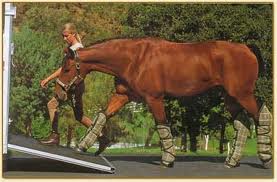Pleuropneumonia in Horses - shipping sickness 3/13
<< Back to Listing
Pleuropneumonia in Horses - shipping sickness 3/13
Mon Feb 26| Over recent years, quite a number of valuable horses have developed acute infection within the lung and chest commonly referred to as 'travel sickness' or 'shipping disease'. Horses that have raced or been subjected to strenuous exercise immediately prior to long distance travelling are particularly prone to developing pleuropneumonia, which if not recognised and treated early, is invariably debilitating and may be fatal.
|
|
| Cause Top Low grade viral infection, breathing contaminated air in poorly ventilated transports and the stress of travel appear to be the main underlying causes. Travel stress includes:
|
|
| Symptoms Top It is important to watch for and recognise the tell-tale signs early, especially during the few days following a long trip. Horses with early pleuropneumonia:
|
|
Prevention Top
|
| Category : | Animal Articles |
| Listing ID : | 5938 |








